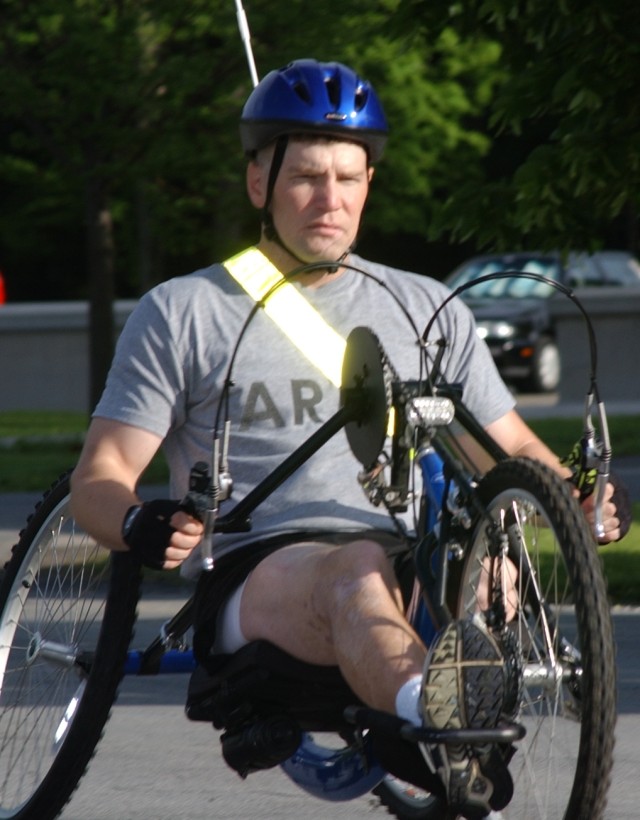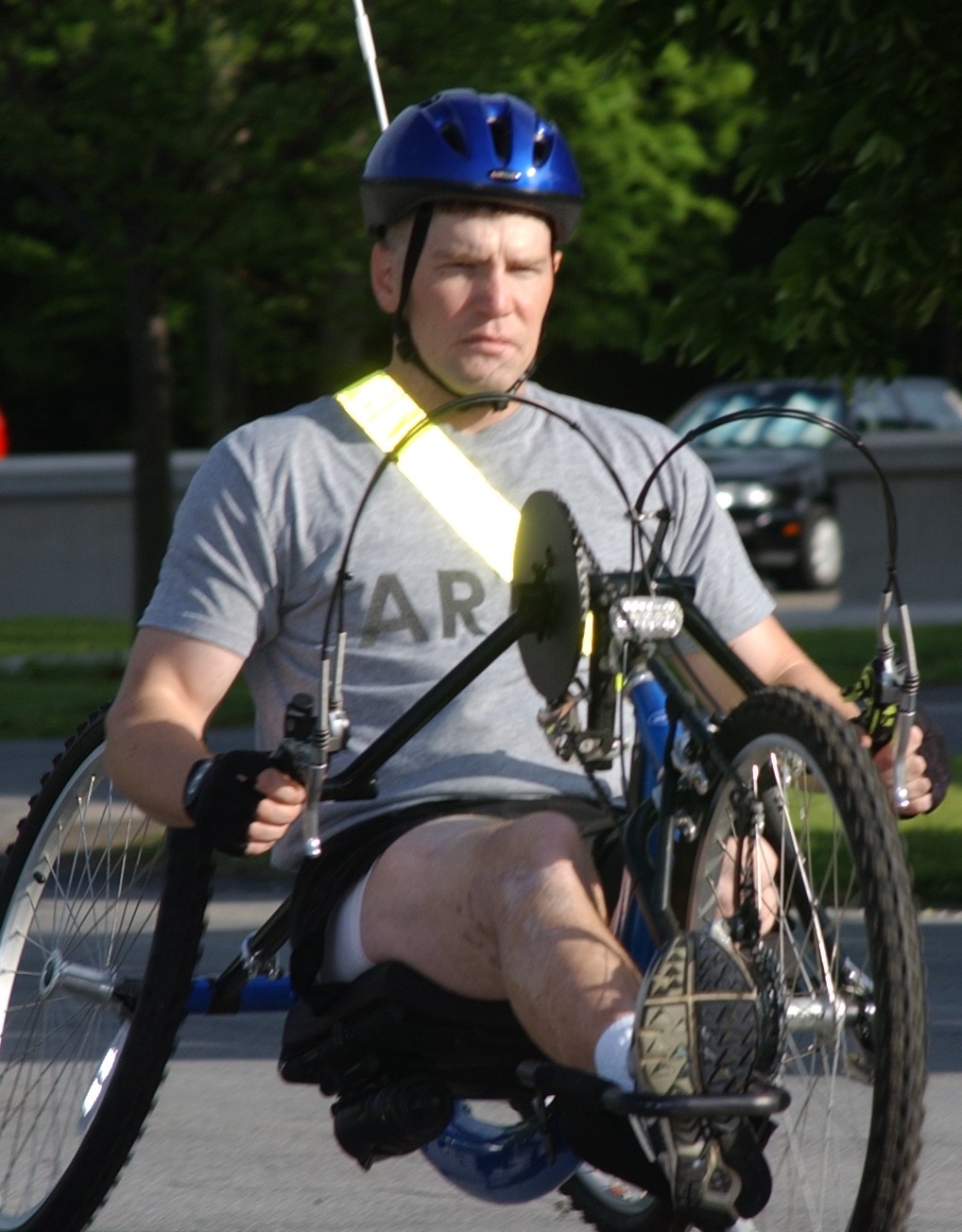(Editor's note: The following article is the second in a series about people overcoming obstacles in their lives.)
After he lost his leg in an explosion, Sgt. 1st Class Roy Mitchell had a choice: give up or thrive in life. He chose the latter.
Now, because of that choice, Mitchell affects countless other injured Soldiers as they watch him overcome one hurdle after another and enjoy an active life.
It was about five years ago, while Mitchell was deployed to Afghanistan, that his vehicle struck an anti-tank mine, leading to the amputation of his left leg. He also suffered third-degree burns on 40 percent of his right leg, a shattered jaw, stress fractures throughout his face, loss of four teeth, a shattered elbow and shrapnel wounds.
Despite intense pain and challenges, Mitchell proved he could remain an active-duty Soldier and now serves as a 1st Brigade Combat Team career counselor. He also has become more physically active than ever before.
For example, he rides a bike called a hand cycle, which he pedals with his arms. With his cycle, he has participated in many events, including a 300-mile ride from the Adirondack Mountains to the Finger Lakes.
Mitchell also plays golf, skis in the winter, and wants to try water skiing when he gets a chance. He coaches the Fort Drum league's 1st BCT softball team and his church's softball team. He also stays busy enjoying time with his wife and five children and participating in several church groups and activities.
He was involved in softball and golf before he got hurt, but he said "all these new opportunities have opened up since the injuries happened.
"My main motivation is to forge roads, open up opportunities that were not open prior," he said. "That attitude of forging new ground has branched out into these sports and the things I participate in now."
As active as he stays, Mitchell admitted he feels a little held back at certain times, like when going to state parks or amusement parks with his Family or going certain places on post. He said walking with his prosthetic or rolling himself in his wheelchair for long periods of time can be extremely tiring.
However, some of those things should not be setbacks for him anymore. A nonprofit organization called Segs4Vets recently presented him with a Segway, a two-wheeled, battery-powered transporter.
"This thing is phenomenal," Mitchell said. "You stand on it, and it takes you down the road for 25 miles. It can go 16 miles per hour, and you can take it on gravel, grass, dirt, hard-packed sand. I'll be able to use it here at work, to get around the brigade area, to go see Soldiers, to go places with my Family. This will provide a greater quality of life for my Family and me.
"Mobility has been the greatest hurdle to overcome, and the Segway will probably give me 60 percent greater mobility than what I had before," he added. "Anything to assist mobility is a blessing of extraordinary size."
Jerry Kerr, a Segs4Vets founder, said Mitchell's perseverance to keep serving his country is admirable.
"We are inspired by Sgt. 1st Class Roy Mitchell's desire to continue to serve his country despite his injuries," he said. "We are grateful for his service, awed by his commitment to our country, and hope this Segway will allow him to fulfill his dream to stay in the Army."
That dream, Mitchell said, is not going away.
"This is my career," he said. "I want to remain in this career, successfully complete this career and retire from this career. That was my goal before my injury, and that goal never changed after my injury.
"I absolutely love the Army, the career, the life," he added. "I don't think I could have provided a better way of life than what the Army has provided for me and my Family. As long as they are happy, and I am happy with my career, that's all I could ever ask for."
Mitchell said it is helping Soldiers and Families that makes his career worthwhile.
"As an infantry squad leader, I was responsible for a team of Soldiers, making sure their quality of life in the Army, their needs, wants and desires were being met," he said. "Now, as a career counselor, I'm also responsible for the needs, wants and desires being met for these Soldiers and their Families. That provides such job satisfaction."
Because of what he has endured, Mitchell now has found another special way to help Soldiers. Whenever he gets a chance, he talks to injured Soldiers and encourages them in their fight for survival, physically or mentally.
"I've had the chance to go visit injured Soldiers at Walter Reed (Army Medical Center)," he said. "When they see me come in with my wheelchair and hear that I'm still an active-duty Soldier, you just see something awake inside them. A lot of doctors and counselors don't even know how to open that up.
"Therapists see the effect we have on those guys because we've been there, we know the struggles they are going to face, and we've overcome those struggles," he added. "I wish I could go down every month and spend time with those guys, just to watch the way they open up and come alive. It's like a cloud lifts off of them, even if just for a minute."
"I talk to those guys and show them what their life can be like afterward," he said. "I tell them, 'Nothing is going to be easy from now on. But if you don't try things and take that first step, you'll stagnate and could slip into dark times and become a disgruntled individual.'"
Doctors recently have told Mitchell to slow down some because he has another surgery coming up. Although he has tried to slow down physically, he is finding ways to be proactive in other areas. Prosthetic companies have asked him to test their products for durability, especially in the cold and snow.
"They want me to field test products before they hit the market to see how they are going to do in multiple environments," he said. "I have slowed down in some areas, but I haven't stopped doing research and development of different prosthetics and participating in the field to try to make things better for everyone else."
When the surgery is over and doctors allow, Mitchell predicted, "I'll come out of the gate smokin' again!"
"With everything I get involved in, I want to try to show and demonstrate that there is life after serious injuries," he added. "The possibilities are endless. The term 'disabled' is only restricted by your imagination."


Social Sharing